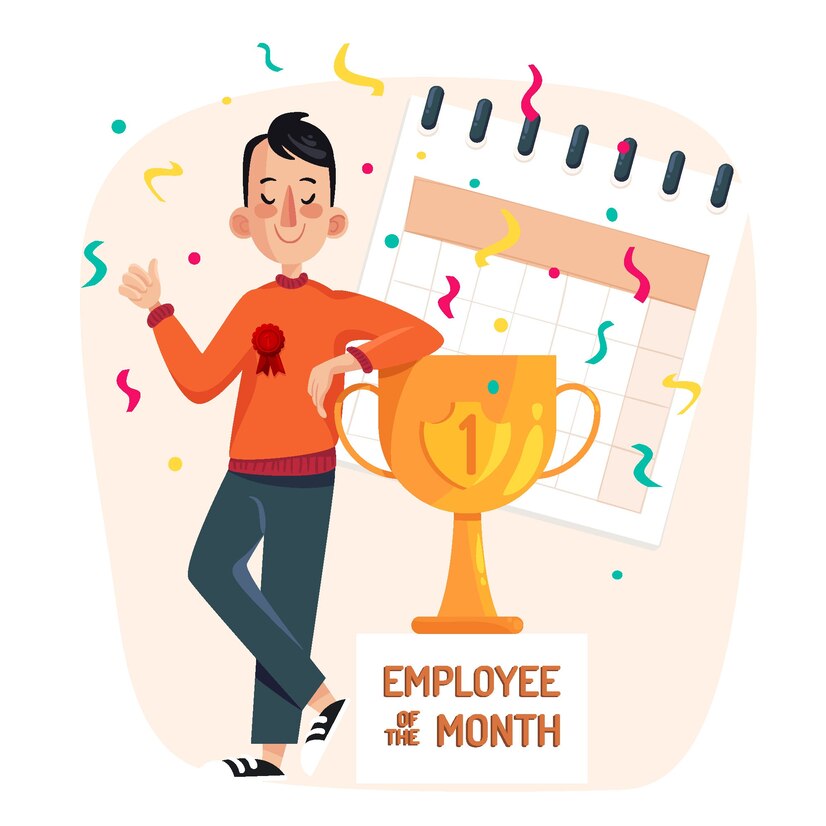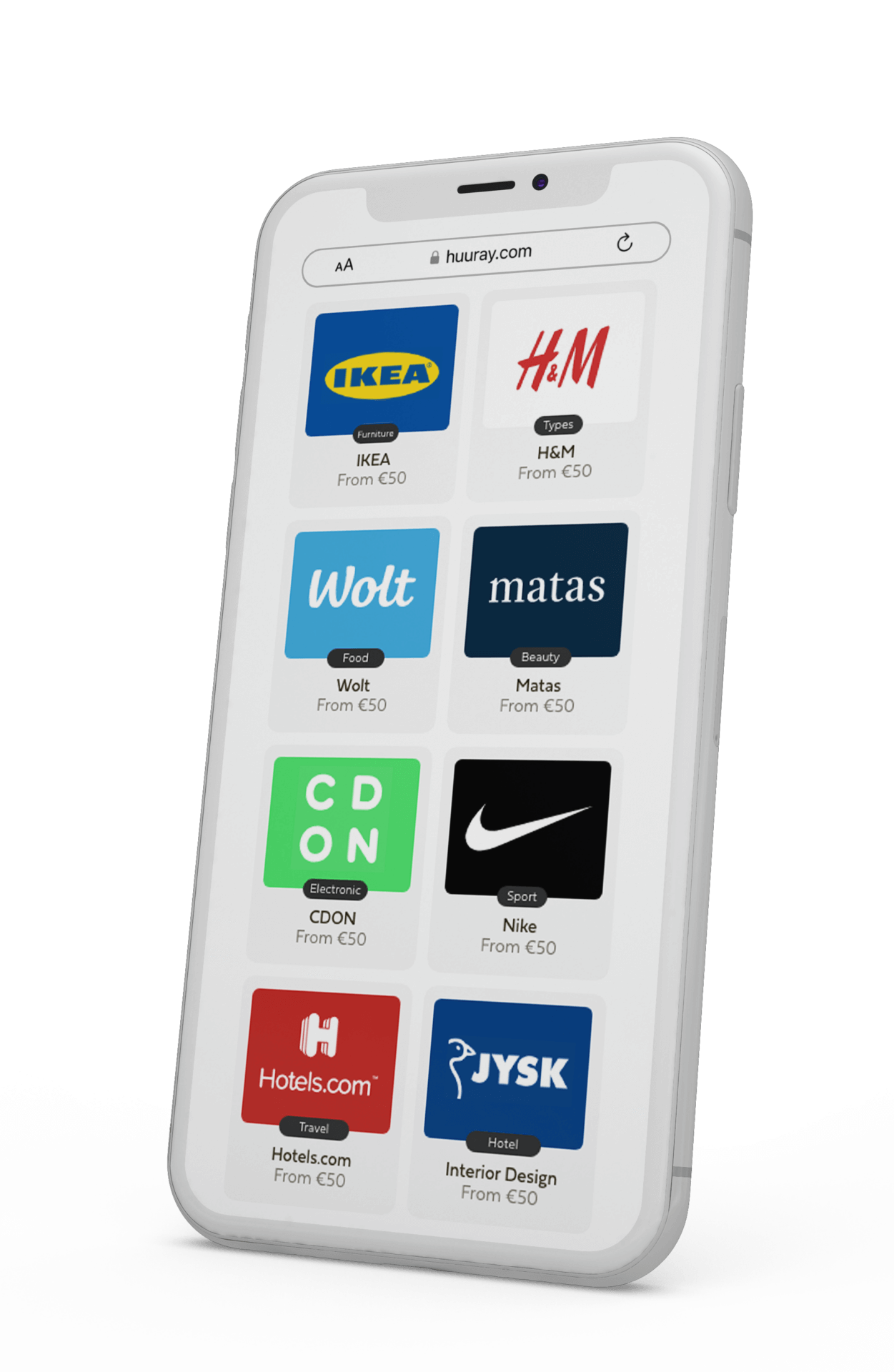25 Employee Awards and Incentives To Motivate


by Signe Hegart
October 5, 2023
Employee recognition is an important aspect of any organization’s culture. It not only boosts employee morale and satisfaction but also improves overall performance and productivity. One effective way to acknowledge and appreciate employees’ hard work is through the use of employee incentives and awards. In this blog post, we will discuss the benefits of implementing a rewards and incentives program and explore different types of employee awards that can help boost engagement and performance across departments.
Jump to section
What are Employee Awards?
Employee awards are recognition programs or initiatives implemented by organizations to acknowledge and reward their employees for their outstanding performance, contributions, and achievements in the workplace. These awards are designed to motivate and incentivize employees, boost morale, and create a positive and productive work environment.
Why are Employee Awards important?
Implementing a rewards and incentives program in your company can have several positive impacts on your employees and the organization as a whole. Here are some key benefits:
- Increased Motivation: When employees know that their hard work and exceptional performance will be recognized and rewarded, they are more motivated to go the extra mile. Employee awards and incentives provide a tangible way to acknowledge their efforts and encourage them to continue performing at their best.
- Improved Engagement: By recognizing and appreciating employees’ contributions, you create a culture of appreciation and engagement. When employees feel valued and appreciated, they are more likely to be committed to their work and the organization’s goals. This leads to higher levels of engagement and a more positive work environment.
- Enhanced Performance: Employee awards and incentives can serve as a powerful tool to drive performance improvement. When employees strive for recognition and rewards, they are more likely to set higher goals and push themselves to achieve them. This can result in improved productivity and performance across departments.
Read also: Employee Recognition Programs: The Key to a Happy Staff
Gift cards as Employee Awards and incentives
Using gift cards as employee awards and incentives can be a practical and effective way to recognize and motivate employees.
Versatility: Gift cards offer recipients the flexibility to choose their own rewards, such as dining, shopping, entertainment, or travel. This flexibility can cater to a wide range of employee preferences.
Personalization: While cash bonuses may feel impersonal, gift cards can be tailored to the recipient’s interests or hobbies, making the reward more meaningful.
Immediate Gratification: Employees can use gift cards right away, providing instant gratification for their hard work or achievements.
Ease of Administration: Managing gift card rewards is relatively straightforward, and they can be easily distributed and tracked.

Send yourself a gift card
25 examples of Employee Awards ????
1.Employee of the Month

This award recognizes outstanding performance on a monthly basis and is a way to motivate and appreciate employees for their consistent efforts and contributions. For employees, being named “Employee of the Month” is more than just a title; it’s a visible testament to their dedication and hard work. It can boost their morale, increase their sense of belonging to the organization, and provide a tangible symbol of their achievements. Knowing that their efforts are acknowledged and rewarded regularly can serve as a strong incentive for employees to maintain high levels of productivity and engagement.
2. Employee of the Quarter
“Employee of the Quarter” recognizes employees who consistently perform at a high level over a more extended period. This can serve as a strong motivator for employees to maintain their exceptional efforts throughout the quarter. With a quarterly timeframe, this award is often tied to specific organizational objectives and key performance indicators (KPIs). Recognizing employees for their contributions over this duration reinforces the alignment of their work with the company’s strategic goals.
3. Employee of the Year
The highest individual honor, this award celebrates exceptional performance and dedication throughout the entire year. Being named “Employee of the Year” is a distinction that stands above all other awards and recognitions within a company. It signifies that the recipient has consistently excelled, outshining their peers in various aspects of their role.
4. Outstanding Performance Award
“The Outstanding Performance Award” is a testament to the exceptional dedication and contributions of employees who consistently exceed expectations. It recognizes their role in propelling the organization forward and sets a standard of excellence that benefits the entire workforce and the company as a whole.
5. Exemplary Leadership Award
“The Exemplary Leadership Award” represents the highest level of leadership excellence within an organization. It acknowledges the profound impact that exceptional leaders have on their teams and the organization as a whole. Recognizing and celebrating such leaders not only motivates them to continue their outstanding work but also sets a standard of leadership excellence for others to aspire to.
6. Innovation Champion Award

“The Innovation Champion Award“ celebrates individuals who are at the forefront of driving innovation within the company. These employees not only introduce creative ideas but also champion their implementation, leading to improvements in processes, products, or services. They inspire a culture of innovation that fosters growth and adaptability.
7. Customer Service Excellence Award
Exceptional customer service is the backbone of any successful business. Employees who consistently go above and beyond to meet customer needs and exceed their expectations are the true ambassadors of a customer-centric culture. Recognizing them reinforces the organization’s commitment to delivering an outstanding customer experience.
8. Team Collaboration Award
Employees who excel in collaborating with their colleagues not only enhance productivity but also contribute to a positive work environment. “The Team Collaboration Award” highlights their ability to foster a sense of unity and camaraderie among team members.
9. Cross-Functional Team Achievement Award
“The Cross-Functional Team Achievement Award” acknowledges teams that span different departments or functions and have successfully achieved significant milestones or completed projects together. It promotes a culture of collaboration and synergy across the organization.
10. Quality Assurance Excellence Award
Maintaining consistent quality standards is vital for customer satisfaction and brand reputation. Employees who consistently deliver high-quality work contribute directly to the organization’s success. “Quality Assurance Excellence Award“ recognizes their commitment to quality and sets a benchmark for excellence.
11. Mentorship Award

Effective mentorship is a valuable resource for employee growth and development. Those who excel in mentoring and guiding their colleagues not only facilitate professional advancement but also create a supportive and nurturing work environment. “The Mentorship Award“ acknowledges their dedication to helping others succeed.
12. Diversity and Inclusion Champion Award
Diversity and inclusion are essential for fostering innovation and a healthy work culture. Employees who actively promote and support diversity initiatives contribute to a more inclusive and equitable workplace. “The Diversity and Inclusion Champion Award” demonstrates the organization’s commitment to diversity and inclusion.
13. Health and Wellness Advocate Award
Employee well-being is crucial for productivity and job satisfaction. Individuals who actively promote and participate in health and wellness programs contribute to a healthier workforce. “The Health and Wellness Advocate Award“ highlights their commitment to creating a positive and healthy workplace.
14. Environmental Sustainability Award
As organizations increasingly prioritize sustainability, employees who make significant contributions to sustainability efforts play a crucial role. “The Environmental Sustainability Award” acknowledges their dedication to reducing the company’s environmental footprint and contributing to a more sustainable future.
15. Salesperson of the Year
Sales professionals play a vital role in revenue generation. Recognizing the Salesperson of the Year celebrates top performers who consistently meet or exceed sales targets, driving the organization’s financial success..
16. Rookie of the Year (for new employees)

New employees who quickly make a substantial impact demonstrate exceptional adaptability and dedication. Recognizing them as Rookie of the Year encourages a culture of rapid learning and achievement among newcomers.
17. Safety Ambassador Award
Prioritizing safety is essential for employee well-being. Employees who actively contribute to creating a safer work environment demonstrate a commitment to their colleagues’ safety and the company’s overall success. “The Safety Ambassador Award“ encourages a culture of safety awareness.
18. Community Service Volunteer Award
Employees who engage in meaningful community service outside of work hours demonstrate social responsibility and a commitment to making a positive impact beyond the workplace. “The Community Service Volunteer Award” celebrates their dedication to giving back to the community.
19. Continuous Improvement Award
Process improvement is essential for efficiency and competitiveness. Recognizing employees who contribute to ongoing process enhancements encourages a culture of continuous improvement and adaptabilit
20. Creativity and Innovation Award
“The Creativity and Innovation Award” acknowledges employees who push boundaries and come up with creative solutions to challenges. Their innovative thinking drives the organization forward and inspires others to think outside the box.
21. Above and Beyond Award

Individuals who consistently exceed expectations demonstrate exceptional dedication and commitment to their roles. Recognizing their efforts reinforces a culture of going the extra mile for the organization and its stakeholders.
22. Cost-Saving Initiatives Award
In a competitive business environment, cost-saving measures are vital for financial stability. Employees who proactively identify and implement cost-saving initiatives demonstrate their commitment to the organization’s success.
23. Employee Wellness Champion Award
A culture of well-being is crucial for employee satisfaction and productivity. Employees who actively promote and support the well-being of their colleagues contribute to a healthier and more positive workplace.
24. Digital Transformation Pioneer Award
In an era of digitalization, employees who drive and adapt to digital transformation initiatives are instrumental in ensuring the organization remains competitive and agile. “The Digital Transformation Pioneer Award” recognizes their role in shaping the company’s digital future.
25. Employee Recognition Program Champion
A robust employee recognition program boosts morale and motivation. Individuals who excel in promoting and managing these programs create a positive work environment and foster a sense of appreciation and belonging among employees.
Read also: Rewards and Incentives: Understanding the Distinction in the Workplace
Implementing an Effective Employee Awards and Incentives Program
To ensure the success of your employee awards and incentives program, here are some key considerations:
1. Clear Criteria: Clearly define the criteria for each award to ensure fairness and transparency. Make sure employees understand what they need to do to be eligible for a particular award.
2. Regular Communication: Keep employees informed about the awards program and any updates or changes. Regularly communicate the criteria, nomination process, and deadlines to ensure employees are aware and can actively participate.
3. Managerial Support: Managers play a crucial role in implementing and maintaining an effective employee awards and incentives program. They should actively promote and recognize outstanding performance, provide feedback and coaching, and ensure fairness in the selection process.
4. Timely Recognition: Timeliness is important when it comes to recognizing and rewarding employees. Make sure awards are given promptly after the achievement or outstanding performance to maximize their impact and motivate employees.
5. Variety and Flexibility: Consider offering a variety of awards and incentives to cater to different employee preferences and motivations. Also, be open to feedback and suggestions from employees to continuously improve and adapt the program.
6. Celebrate Achievements: When an employee receives an award or incentive, celebrate their achievement publicly. This not only acknowledges their hard work but also motivates other employees to strive for similar recognition.
7. Continuous Evaluation: Regularly evaluate the effectiveness of your employee awards and incentives program. Collect feedback from employees and analyze the impact of the program on employee morale and performance. Make adjustments as necessary to ensure the program remains effective and aligned with the organization’s goals.
Read also: 23 Employee Wellness Programs Worth Considering
Let’s have a chat
3 statistics about Employee Recognition and Awards ????
37% of employees report that employee recognition is the most important thing their manager or company can do to motivate them to produce great work.
80% of employees say they’re motivated to work harder when they’re recognized for their work by their superiors.
Employees who think they’ll be recognized are 2.7 times more likely to have a high engagement at work.
Source: Zippia
How are Employee Awards typically presented?
Employee awards are typically presented in a variety of ways to recognize and celebrate the achievements and contributions of employees. Here are some common ways in which employee awards are presented:

Corporate Events
Many companies choose to present employee awards during corporate events such as annual general meetings, town hall meetings, or company-wide celebrations. These events provide a platform for company leaders to publicly acknowledge and honor employees in front of their peers.

Award Ceremonies
Some companies organize specific award ceremonies dedicated solely to recognizing employee achievements. These ceremonies may include formal presentations, speeches, and even entertainment to create a memorable and special experience for the awardees.

Team Meetings
Employee awards can also be presented during team meetings. This allows for a more intimate setting where team members can appreciate and celebrate the accomplishments of their colleagues. It also provides an opportunity for team leaders to publicly recognize the efforts of their team members.

Email or Internal Communication
In cases where remote work or geographical constraints make it challenging to gather all employees in one place, companies may choose to present employee awards through email or other internal communication channels. This method allows for efficient and widespread recognition across the organization.

Personal One-on-One Recognition
Besides formal ceremonies or events, employee awards can also be presented through personal one-on-one recognition. This can involve a private meeting with the employee, where their achievements are discussed and they are presented with the award as a token of appreciation.
Read also: International Prepaid Cards: A Global Employee Reward
The difference between monetary awards and non-monetary awards for employees
Monetary Awards
- Cash Bonuses: These are one of the most straightforward forms of monetary recognition. They provide employees with immediate financial gratification for their exceptional performance or achievement of specific goals. One-time bonuses are often used to celebrate exceptional accomplishments, while recurring bonuses, such as annual performance bonuses, can incentivize ongoing excellence.
- Salary Increases: Salary increases involve permanently raising an employee’s base salary as a reward for consistent and outstanding performance. They can also be structured as part of a performance-based pay scale, where employees progress to higher salary bands as they achieve predefined milestones or meet performance goals.
- Stock Options: Stock options grant employees the opportunity to purchase company shares at a predetermined price. This not only serves as a financial reward but also aligns the employee’s interests with the company’s success. Stock options are typically offered to reward long-term commitment and significant contributions to the organization.
- Profit Sharing: Profit sharing programs distribute a portion of the company’s profits among employees based on predefined criteria. This can be an equitable way to recognize and reward collective effort in achieving company financial goals.
- Commission: Commonly used in sales roles, commission is a form of variable compensation where employees earn a percentage of the sales they generate. It directly ties an employee’s earnings to their performance and can be a powerful motivator in sales-driven environments.
- Performance-Based Pay: Performance-based pay involves providing additional compensation based on an employee’s performance metrics. This might include achieving sales targets, billable hours in consulting firms, or successful project completion in project-based industries.
Non-Monetary Awards
- Trophies and Plaques: These physical awards, such as trophies, plaques, or certificates, are a tangible symbol of recognition for an employee’s achievements or milestones. They can serve as a lasting reminder of their success.
- Public Recognition: Public acknowledgment of an employee’s accomplishments during meetings, company-wide emails, or on social platforms can boost an employee’s morale and enhance their status within the organization. It fosters a positive company culture.
- Time Off: Granting additional vacation days, paid time off, or flexible work arrangements as rewards for exceptional performance promotes work-life balance and demonstrates the organization’s appreciation for its employees’ hard work.
- Training and Development: Offering opportunities for skill development, workshops, or courses helps employees grow in their careers and gain new skills. It also signals the company’s investment in the employee’s long-term success.
- Gifts and Merchandise: Providing non-cash rewards like gift cards, merchandise, or experiences (e.g., spa days, concert tickets) adds a personal touch to recognition, allowing employees to choose rewards that align with their interests.
- Opportunities for Advancement: Offering the chance to take on more responsibility, move to a higher position within the company, or work on more challenging projects can be a valuable non-monetary reward, fostering career growth.
- Mentorship and Coaching: Connecting employees with mentors or coaches can be a non-monetary form of recognition that helps them further develop their skills and advance their careers through guidance and support.
Balancing both monetary and non-monetary awards is crucial in creating a comprehensive employee recognition program that caters to various needs and preferences while promoting employee satisfaction, motivation, and personal growth. The choice between these types of awards should align with the company’s culture and available budget, as well as the specific achievements and goals being recognized.
Conclusion
Employee awards can be presented in various ways, depending on the company’s culture, size, and resources. Whether it’s through corporate events, award ceremonies, team meetings, email or internal communication, or personal one-on-one recognition, the goal is to acknowledge and celebrate the accomplishments of employees. By choosing the right method, companies can create a positive and memorable experience that motivates and inspires their employees to continue performing at their best.



Let’s have a chat
FAQ
Employee awards offer numerous financial benefits:
Enhanced Retention: Recognizing and rewarding employees fosters a positive environment, lifting morale. This can lead to higher job satisfaction and lower turnover, reducing long-term hiring and training costs.
Boosted Productivity: Valued employees are more motivated to excel, increasing efficiency and work quality. Improved productivity can yield cost savings and revenue growth.
Customer Satisfaction: Recognized employees provide better service, enhancing customer satisfaction and loyalty. Satisfied customers are more likely to stay and refer others, boosting sales and revenue.
Talent Attraction: A strong awards program signals that a company values and rewards its employees. This can attract high-performing talent, positively impacting overall company performance and financial success.
Employee awards serve multiple vital functions within an organization:
Recognition and Appreciation: They acknowledge and validate employees’ hard work, dedication, and exceptional performance, highlighting their contributions to company success.
Cultivating a Positive Culture: Awards foster a culture of positivity, lifting employee morale. Recognition instills pride, motivation, and loyalty, resulting in a more engaged and productive workforce.
Retention Tool: By demonstrating value and appreciation for employee achievements, organizations enhance job satisfaction and loyalty, reducing turnover rates.
Inspiration for Excellence: Awards motivate others to excel. Witnessing colleagues being recognized creates healthy competition and encourages everyone to perform at their best.
Enhancing Employer Brand: Publicly recognizing outstanding employees showcases a commitment to employee appreciation, bolstering the organization’s image both internally and externally.
Yes, you can! Huuray handles orders in bulk, so you can send gift cards to as many recipients as you need. Offer a personalized experience with your organization’s logo, customized fonts, colors, and message.